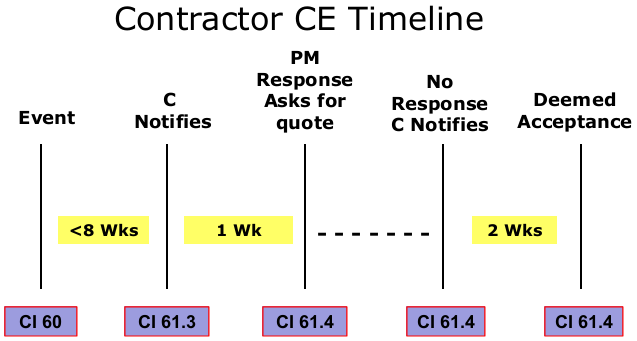Notification Of Compensation Events
-
NEC requires notification of any matter which increases the total of the prices, delays completion, delays the meeting of a key date, or impairs the performance of the works. Notification of Compensation Events is covered under Clause 61.
-
The following diagram shows the basic notification process1:

- One of the key and most uncertain elements within the notification of the Compensation Event mechanism is the eight weeks time-bar included in Clause 61.3, compared with NEC2 where it was two weeks with no time-bar.
Eight Weeks Time-Bar
-
Clause 61.3 relates to the Contractor’s obligations to notify Compensation Events within eight weeks of becoming aware. NEC Guidance Notes state:
“To avoid having to deal with a compensation event long after it has occurred there is a time limit on notification by the Contractor. Failure to comply with this time limit ‘time-bars’ the Contractor from any compensation for the event.” (NEC3, 2013)
-
The primary aim of this time-bar clause is to alert the Project Manager to the Contractor’s claim and allow it to be evaluated and prevent stockpiling of claims until the end of the project. It should be noted that parties often confuse issuing Early Warning Notices (EWN’s) with issuing notification of Compensation Events. They are not the same and an EWN is not sufficient for notification of a Compensation Event. The use of the time-bar places an obligation on the Contractor to issue a notification under Clause 61.3.
-
Eggleston, (2006) summarises the intention of Clause 61.3 to be that, if a Contractor fails to notify a Compensation Event within eight weeks of becoming aware of the event, he is not entitled to a change to the Prices, the Completion Date or a Key Date. There is effectively a limitation period and this can have grave consequences for the Contractor because failure to issue a notification in the eight weeks will mean he is not entitled to a change in the Prices, the Completion Date or a Key Date.
Uncertainty – Does The Eight Weeks Time-Bar Hold Up?
-
The literature shows that the eight weeks time-bar is uncertain and has yet to be tested properly in the Courts. The following arguments have been raised regarding possible challenges to the NEC3 time-bar Clause 61.3 for notification of Compensation Events:
-
Interpretation arguments (Lal, 2007; Ennis, 2010). The effect of failure to lodge a claim within the time limit is presently unclear in terms of judicial authority. There is no direct authority on the question of the time-bar in relation to Clause 61.3. This clause appears likely to be viewed as a Condition Precedent.
-
Prevention Principle arguments (Lal, 2007; Gould, 2008). This provides where one party to a contract has failed to perform a condition of the contract, the other party cannot rely on its non-performance if it was caused by its own wrongful act. As Lal (2007) states, the early English Law authorities on the operation of the prevention principle in the construction law context do not deal with time-bar clauses2.
-
Conflicting Case Law (Lal, 2007; Gould, 2008). There is a jurisprudential tension or conceptual difficulty between the prevention principle and time-bar clauses. Lal (2007) identifies a number of cases from Australia and, to a lesser degree, in Scotland. The approaches in these cases may provide some guidance only. Commonly cited in support of bespoke time-bar clauses taking effect as they stand are the Australian cases of Turner Corporation Ltd v Austotel Pty Ltd3 and Décor Ceilings Pty Ltd v Cox Constructions Pty Ltd (No 2)4 and the Scottish case of City Inn Ltd v Shepherd Construction Ltd5. However, the following Australian cases of Gaymark Investments Pty Ltd v Walter Construction Group Ltd and Peninsula Balmain Pty Ltd v Abigroup Contractors Corp Pty Ltd have held that the “prevention principle” defeats such clauses.
-
Do People Know About The Eight Weeks Time-Bar?
-
Research was carried out into whether people in the industry understood the eight weeks time-bar. This showed that 92% of the respondents know about the eight weeks time-bar and that they may forfeit their claim for time and/or money if they fail to issue a Notification of Compensation Event. A further question was asked regarding how often the eight weeks time-bar was enforced. 29% said it was never enforced and a further 37% said it was only enforced 25% of the time. Only 8% said it was enforced 100% of the time.
-
Further investigation into this issue was conducted through interviews. A Project Manager interviewed summed up the uncertainty:
“Is it always adhered to? No it’s not. I think there’s a problem in case law of time-bars and do they actually stick. We’ve got evidence of yes they do or no they don’t. I don’t think anyone really knows whether it is actually a Condition Precedent.” (Project Manager Interview)
-
The eight weeks time frame is generally considered to be a Condition Precedent (although this has not been confirmed in the Courts for this NEC3 wording), but the evidence from the research shows that the clause is not very often adhered to or enforced. The evidence also shows that people know about it and understand the consequences of not adhering to it. The only time it appears to be adhered to or enforced is in a dispute situation as explained in an interview with an Adjudicator:
“Very often the parties do not follow the time-bar provision in NEC Contracts, but then sometimes when there is a dispute, look to enforce those provisions, having failed to do so through the whole course of the project. I have often seen contracts where both sides agree not to be bound by the time-bar provisions.” (Adjudicator Interview)
-
This leads you to the question of why do parties fail to adhere to or enforce this contract provision.
Summary
-
In summary, there is uncertainty as to whether the eight weeks time-bar bites but it is likely that it would and Contractors should avoid being in the position of having to argue this point. Notification of Compensation Events also becomes a problem when there are a large number of Compensation Events that need to be priced and programmed.
-
If Project Managers slavishly adhere to the contract with regard to the time-bar, and there are a lot of Compensation Events, then this becomes a burden to complete within the contract timescales and requires additional resources to price and programme the Compensation Events. The problem with this is that Contractors cannot recover the costs of producing the Compensation Event quotations under Options A and B, which therefore becomes a cost burden on the Contractor. The Contractor may not be able to control the level of changes to the Works Information (i.e. Employer design changes) and his costs escalate.
-
The evidence appears to show that the parties often agree to allow the timescales to lapse and deal with matters at a later date.
Bibliography
-
Eggleston, B. 2006. The NEC3 Engineering and Construction Contract: A Commentary. Oxford: Blackwell Publishing.
-
Ennis, Christopher. 2010. Financial Claims under NEC3 Contracts: An Overview. A paper presented to the Society of Construction Law Annual Conference in Leeds on 5 March 2010.
-
Gould, N. 2008. NEC 3: Construction Contract of the Future? Construction Law Journal 24 (2008). p.271-286.
-
Lal, H. 2007. The Rise and Rise of Time-Bar Clauses for Contractors’ Claims: Issues for Construction Arbitrators. A paper presented to a joint meeting of the Society of Construction Law and the Society of Construction Arbitrators on 5 June 2007.
-
NEC (2013) NEC3 Engineering and Construction Contract Guidance Notes. London: Thomas Telford.
Footnotes
1. Note: Sub-contractor timescales are slightly different.
2. For instance Holme v Guppy (1831) 3 M & LJ 387 and Dodd v Churton (1897) 1 QB 562, CA the question concerned the deduction of liquidated damages. More recent cases are no different, Peak Construction (Liverpool) Ltd v McKinney Foundations Ltd and Trollope & Colls Ltd V North West Metropolitan Regional Hospital Board (CA, unreported). Even more recently these authorities were reviewed in Multiplex Constructions (UK) Ltd v Honeywell Control Systems (No 2)
3. Turner Corporation Ltd v Austotel Pty Ltd (1997) 13 BCL 378, Supreme Ct NSW
4. Décor Ceilings Pty Ltd v Cox Constructions Pty Ltd (No 2) [2005] SASC 483, [2006] CILL 2311, Supreme Ct Sth Aus.
5. City Inn Ltd v Shepherd Construction Ltd 2002 SLT 781, [2001] SCLR 961, Outer Hse, Ct of Sess
-
Sheffield
The Annexe,
260 Ecclesall Road South,
Ecclesall,
Sheffield,
S11 9PSTel - 0114 230 1329
-
London
Adam House,
7-10 Adam Street,
London,
WC2N 6AATel – 020 7520 9295
-
Leeds
Suite 69,
4100 Park Approach,
Thorpe Park,
Leeds,
LS15 8GBTel - 0113 397 0358
-
Warrington
Suite 41,
Lakeview 600,
Lakeside Drive,
Centre Park Square,
Warrington,
WA1 1RWTel - 01925 984705
-
Manchester
3 Hardman Street,
Manchester,
M3 3HFTel - 0114 230 1329
-
Birmingham
Birmingham Business Park,
4200 Waterside Centre,
Solihull Parkway,
Birmingham,
B37 7YNTel - 0121 481 2381
-
Liverpool
Horton House,
Exchange Flags,
Liverpool,
L2 3PFTel - 07753 837149
